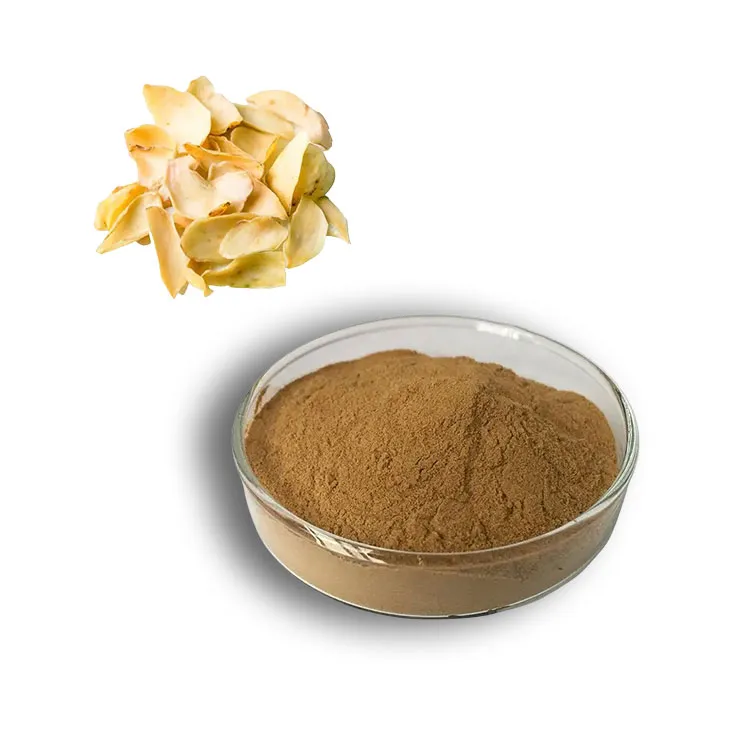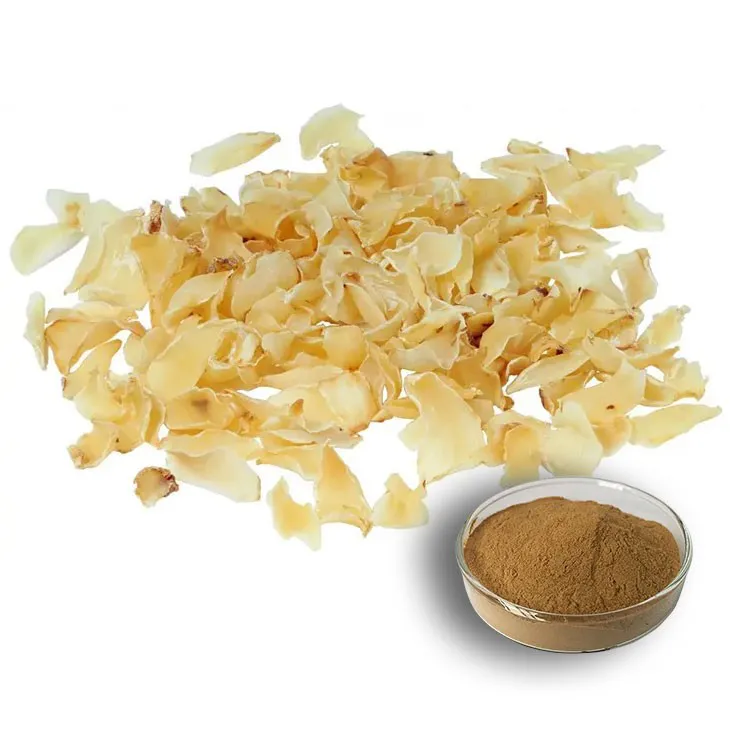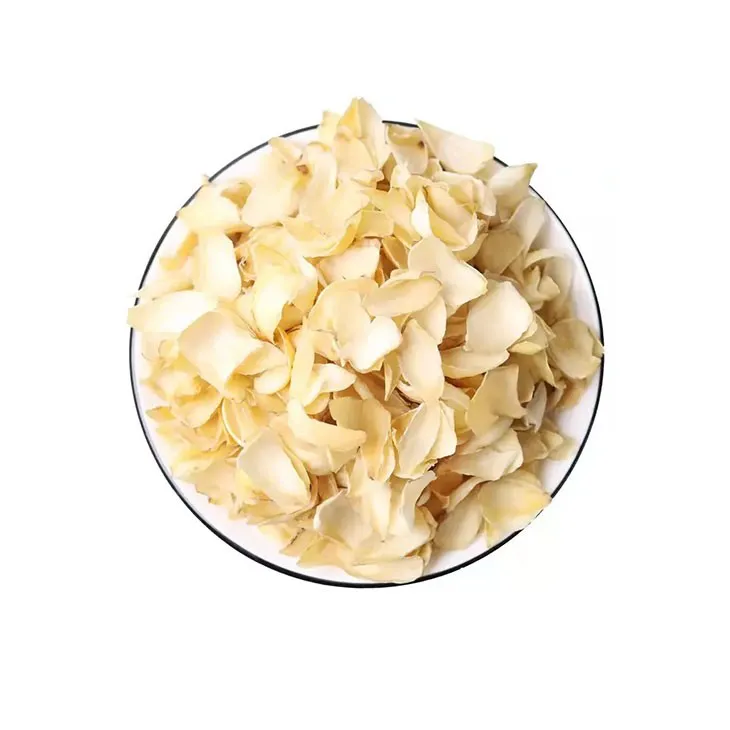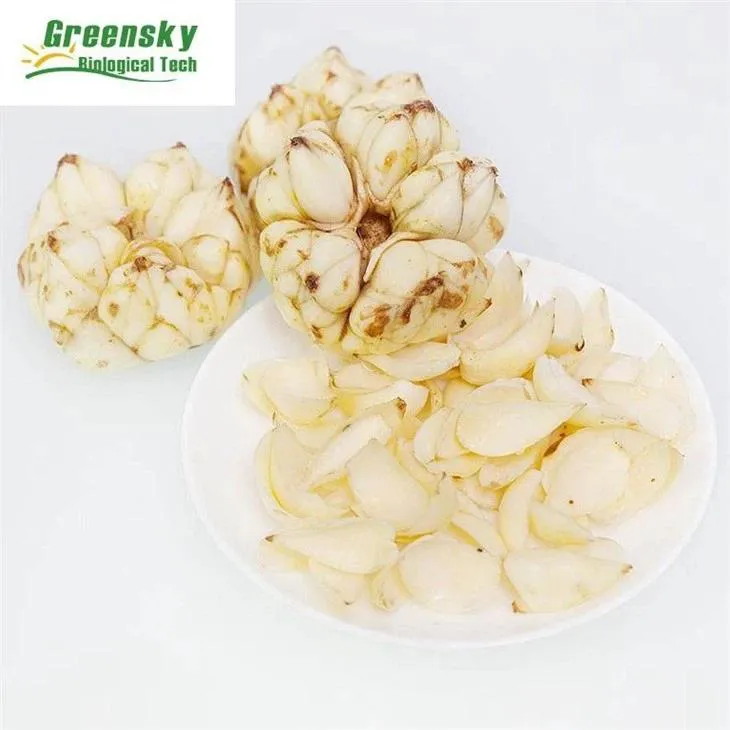- 0086-571-85302990
- sales@greenskybio.com
Bulk purchase of lily extract.
2024-11-26

Introduction
The decision to engage in a bulk purchase of Lily extract is indeed a multi - faceted one. Lily extract has been gaining significant attention in recent years due to its rich composition of bioactive compounds. These compounds endow Lily extract with a wide range of properties that are highly sought - after in numerous industries.

The Source of Lily: A Crucial Factor
Wild vs. Cultivated Lilies
When considering a bulk purchase of lily extract, one of the most fundamental aspects to take into account is the origin of the lilies. There are two main sources: wild lilies and cultivated lilies.
-
Wild Lilies:
Wild lilies can sometimes offer unique chemical profiles. However, harvesting from the wild may pose several challenges.
- Quality Variability: The quality of wild - sourced lily extract can be highly variable. This is because the growing conditions in the wild are not as controlled as in cultivated settings. Factors such as soil type, climate, and exposure to pests and diseases can all influence the composition of the lilies and, consequently, the extract.
- Availability and Sustainability: Over - harvesting of wild lilies can lead to a depletion of natural resources. Many wild lily species are also protected, and harvesting them without proper authorization can be illegal. This makes the supply of wild - sourced lily extract less reliable in the long term.
-
Cultivated Lilies:
Cultivated lilies, on the other hand, offer several advantages.
- Quality Control: Growers can carefully control the growing conditions of cultivated lilies. This includes factors such as the type of soil, the amount of water and sunlight, and the use of fertilizers and pesticides. As a result, the quality of lily extract sourced from cultivated lilies can be more consistent.
- Sustainable Supply: Cultivation allows for a more sustainable supply of lily extract. Growers can plan their production based on market demand, ensuring a stable supply of lilies for extraction. Moreover, sustainable cultivation practices can be implemented to minimize the environmental impact.

Regulatory Compliance: A Necessity
Another critical aspect of bulk purchasing lily extract is ensuring regulatory compliance. Different regions around the world have diverse regulations regarding the use and sale of lily extract.
The Food and Dietary Supplement Industry
In the food and dietary supplement industry, for example, regulations are particularly strict.
-
Safety Requirements:
The safety of lily extract is of utmost importance. Regulatory bodies often require extensive testing to ensure that the extract does not contain harmful substances. This includes testing for heavy metals, pesticides, and other contaminants.
-
Labeling Requirements:
Accurate labeling is also crucial. Labels must clearly state the ingredients, the source of the lily extract, and any potential allergens. In addition, any health claims associated with the lily extract must be supported by scientific evidence.
Other Industries
The regulations also extend to other industries that use lily extract, such as the cosmetic and pharmaceutical industries.
-
Cosmetic Industry:
In the cosmetic industry, regulations govern the use of lily extract in products such as creams, lotions, and perfumes. These regulations ensure that the products are safe for use on the skin and do not cause any adverse reactions.
-
Pharmaceutical Industry:
For the pharmaceutical industry, the regulations are even more stringent. Lily extract used in pharmaceutical products must meet high - quality standards and undergo rigorous clinical trials to prove its efficacy and safety.

Research and Development: Staying Ahead
The field of lily extract is constantly evolving, with new research uncovering additional applications and potential benefits. Therefore, research and development play a significant role in the decision to make a bulk purchase.
The Importance of Supplier Involvement in R & D
When choosing a supplier for lily extract, it is highly advantageous to select one that is involved in or supports research.
-
Product Innovation:
A supplier involved in research is more likely to develop new and improved forms of lily extract. This can lead to products with enhanced properties, such as increased bioavailability or more targeted biological activities.
-
Competitive Edge:
For companies using lily extract in their products, partnering with a research - oriented supplier can provide a competitive edge. They can be the first to introduce innovative products to the market, attracting more customers and increasing market share.
Emerging Applications of Lily Extract
New applications of lily extract are continuously being discovered, further highlighting the importance of research.
-
Health - related Applications:
Recent research has suggested that lily extract may have potential benefits in areas such as anti - inflammation, antioxidant activity, and even in the treatment of certain diseases. For example, some studies have shown that certain compounds in lily extract can help reduce oxidative stress in the body, which is associated with a variety of health problems.
-
Non - health - related Applications:
Lily extract is also finding applications in non - health - related fields. In the textile industry, for instance, it is being explored for its potential to impart natural color and antimicrobial properties to fabrics.

Quality Control and Assurance
Ensuring the quality of the lily extract is essential during a bulk purchase.
Testing and Analysis
Comprehensive testing and analysis should be carried out on the lily extract.
-
Chemical Composition:
The chemical composition of the extract should be analyzed to ensure that it contains the desired bioactive compounds in the appropriate concentrations. This can be done using techniques such as high - performance liquid chromatography (HPLC) and mass spectrometry (MS).
-
Physical Properties:
The physical properties of the extract, such as its color, odor, and solubility, should also be examined. These properties can give an indication of the quality and purity of the extract.
Certifications and Standards
Look for suppliers who can provide relevant certifications and adhere to industry standards.
-
Good Manufacturing Practice (GMP):
Suppliers who follow GMP ensure that their production processes are of high quality and meet strict hygiene and safety requirements. This helps to guarantee the consistency and quality of the lily extract.
-
Organic Certifications:
If the lily extract is sourced from organic lilies, relevant organic certifications can provide assurance of the environmental sustainability and purity of the product.
Cost Considerations
Cost is an important factor in any bulk purchase decision, and the purchase of lily extract is no exception.
Price vs. Quality
It is essential to find a balance between price and quality.
-
Low - cost Options:
While low - cost lily extract may seem appealing, it is important to be cautious. Cheap extracts may be of lower quality, sourced from unreliable suppliers, or may not meet regulatory requirements. This can lead to potential problems in the long run, such as product recalls or legal issues.
-
High - quality Options:
On the other hand, high - quality lily extract may come at a higher price. However, it is often worth the investment. High - quality extract can ensure better product performance, regulatory compliance, and customer satisfaction.
Volume - based Discounts
When making a bulk purchase, it is important to negotiate volume - based discounts with suppliers.
-
Supplier Negotiation:
Engage in discussions with suppliers to secure the best possible price for large - quantity purchases. This can significantly reduce the overall cost of the lily extract.
-
Long - term Contracts:
Consider entering into long - term contracts with suppliers. This can provide additional cost savings and ensure a stable supply of lily extract.
Conclusion
In conclusion, a bulk purchase of lily extract is a complex decision that involves considering multiple factors. The source of the lily, regulatory compliance, research and development, quality control, and cost all play important roles. By carefully evaluating these aspects and choosing the right supplier, companies can make a successful bulk purchase of lily extract that can bring numerous benefits in various industries.
FAQ:
What are the main factors to consider when making a bulk purchase of lily extract?
When making a bulk purchase of lily extract, several main factors need to be considered. Firstly, the source of the lily is crucial. Whether it is from wild or cultivated lilies affects quality and supply stability, with sustainable cultivation being a better long - term option. Secondly, regulatory compliance is essential as different regions have different rules for the use and sale of lily extract, especially in the food and dietary supplement industries. Finally, research and development is also a factor. A supplier involved in or supporting research can offer an advantage in product innovation and competitiveness.
Why is the source of lily important in bulk purchase of lily extract?
The source of lily is important in bulk purchase of lily extract because it impacts both quality and availability. If sourced from wild lilies, there may be issues regarding over - harvesting and inconsistent quality. On the other hand, lily from sustainable cultivation is more environmentally friendly and can ensure a more stable supply over time.
How can one ensure regulatory compliance when purchasing lily extract in bulk?
To ensure regulatory compliance when purchasing lily extract in bulk, one must first be aware of the regulations in the regions where the extract will be used or sold. This may involve researching food and dietary supplement regulations. Then, it is necessary to verify that the supplier provides documentation showing that their lily extract meets all relevant safety and labeling requirements.
What role does research and development play in the bulk purchase of lily extract?
Research and development plays an important role in the bulk purchase of lily extract. As new applications and potential benefits of lily extract are continuously being discovered, choosing a supplier involved in or supporting research can give an edge in product innovation. This can make the products using the lily extract more competitive in the market.
How does the quality of lily extract from different sources vary?
The quality of lily extract can vary depending on its source. Lily extract from wild lilies may be subject to more variability in quality due to differences in growing conditions that are less controlled. In contrast, lily extract from cultivated sources, especially those with sustainable cultivation practices, can offer more consistent quality as the growing conditions are more standardized.
Related literature
- Bioactive Compounds in Lily Extract: Properties and Potential Applications"
- "Sustainable Sourcing of Lily for Extract Production: A Review"
- "Regulatory Frameworks for Lily Extract in the Global Market"
- ▶ Hesperidin
- ▶ citrus bioflavonoids
- ▶ plant extract
- ▶ lycopene
- ▶ Diosmin
- ▶ Grape seed extract
- ▶ Sea buckthorn Juice Powder
- ▶ Beetroot powder
- ▶ Hops Extract
- ▶ Artichoke Extract
- ▶ Reishi mushroom extract
- ▶ Astaxanthin
- ▶ Green Tea Extract
- ▶ Curcumin Extract
- ▶ Horse Chestnut Extract
- ▶ Other Problems
- ▶ Boswellia Serrata Extract
- ▶ Resveratrol Extract
- ▶ Marigold Extract
- ▶ Grape Leaf Extract
- ▶ blog3
- ▶ blog4
-
Chinese Withania somnifera Extract Factory.
2024-11-26
-
中国松树皮提取物粉粉末供应商
2024-11-26
-
High - quality Marigold Extract Products.
2024-11-26
-
100% Pure Natural Mango - Flavored Powder.
2024-11-26
-
Red Wine Extract
2024-11-26
-
Clove Powder
2024-11-26
-
Longan Extract
2024-11-26
-
Red Date Extract
2024-11-26
-
Thunder God Vine Extract
2024-11-26
-
Black Garlic Extract
2024-11-26
-
Mango flavored powder
2024-11-26
-
Curcumin
2024-11-26
-
Dandelion Root Extract
2024-11-26
-
Chaste Berry Extract
2024-11-26





















